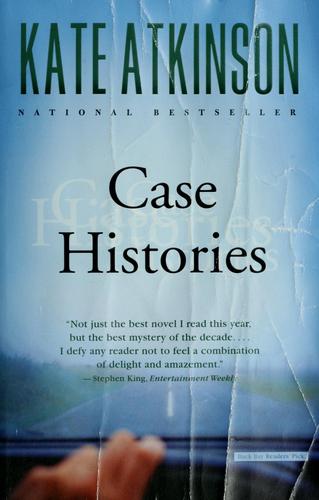Case Histories
And she was crying because she didn't believe in Jesus or dog heaven and no one was ever going to lie in bed with her on a Sunday morning and read the papers or rub her back and say, "Is there anything I can do for you?" And because there was no happiness, only emptiness. And because she wanted to be sixteen years old with long shiny hair (which she'd never had), and she wanted to be looking anxiously out of an upstairs window and hear her mother downstairs shouting, "He's here," and then she would run lightly down the stairs and climb into the car where at the wheel would be her good-looking boyfriend and they would drive away and have warm, blurry sex somewhere and then he would bring her back home and her family would be waiting. Victor would acknowledge her with a gruff paternal nod as she came in the door, contrary teenage Julia would ignore her while willowy first-year student Sylvia would smile in a superior manner. Somewhere, in the guest bedroom perhaps, the vague unformed shape of a five-year old Annabelle could be found sleeping. And Rosemary, her mother, would ask her, in a womanly, conspiratorial way, if she'd had a nice time and then would offer her hot milk and honey (which she was sure she had never done in real life) and perhaps before she dropped into the sweet untroubled sleep of a pretty sixteen-year-old, Amelia would look in on Olivia, eight years old and safely asleep in her own bed.
Kate Atkinson is so truly world-class at writing sweet, flawed people who want and deserve and do not get happy endings — Life After Life was one of my favorite books of 2021, and transcription (having chosen to read it purely out of Atkinson Mania) was, despite some plotting missteps, equally fun and rich. And much of that same brilliance is on display here: her ability to move through dark humor, sweet innocence, and cutting wit often in the same paragraph is channeled through a host of thorough and well-crafted characters who often are not afforded agency or interiority but lesser authors of the genre.
Where I think she stumbles a bit here is in marrying that terrific joie de vivre and personality work to a plot that demands a certain level of convention and satisfaction. Crime fiction (fair play or no) is a bit of a contract with the reader: if a book opens with three disparate murders, you are meant to believe that the book will end with the resolution of those three murders, and also a satisfactory intertwining of the three — and indeed the pleasure of the genre is you weighing every single new scrap of information, every tell and tossed-off detail, and seeing if it fits into the whole or sways your analysis. Atkinson knows this — she ends the book (no spoilers, at least in any meaningful sense!) with resolutions to all three murders and, if you squint, a rough lattice that conjoins the triptych.
But I am a snob with these things, having been spoiled by Christie and her uncanny mastery of puzzle-box craftsmanship; and perhaps it is an unfair standard to judge any work that attempts to elevate the murder mystery into the realms of literary fiction by the standards of Christie, but nonetheless that is the standard, and Atkinson finds wanting. Jackson Brodie is no Hercule Poirot (perhaps this is one of those situations where the cliche was less obvious in 2004, but "British cop with a gruff exterior but sweet heart and a sad past" does not exactly Do It For Me), and the revelations in the third act meant to be shocking were easily sniffed out in the first act, and I was left with a sense of — not the satisfaction that great mystery novels can provide, nor the metatextual refutation of such satisfaction offered by works like The Name of the Rose — fondness, for the people whom I got to spend some time with, though not exactly an aching to spend any more with them.
(Also, as mentioned in The Diamond Age: it is poor analysis, but nonetheless relevant to say that books about dead daughters now take on a deep and newly-textured pallor in a way that I could have not imagined a year ago.)
